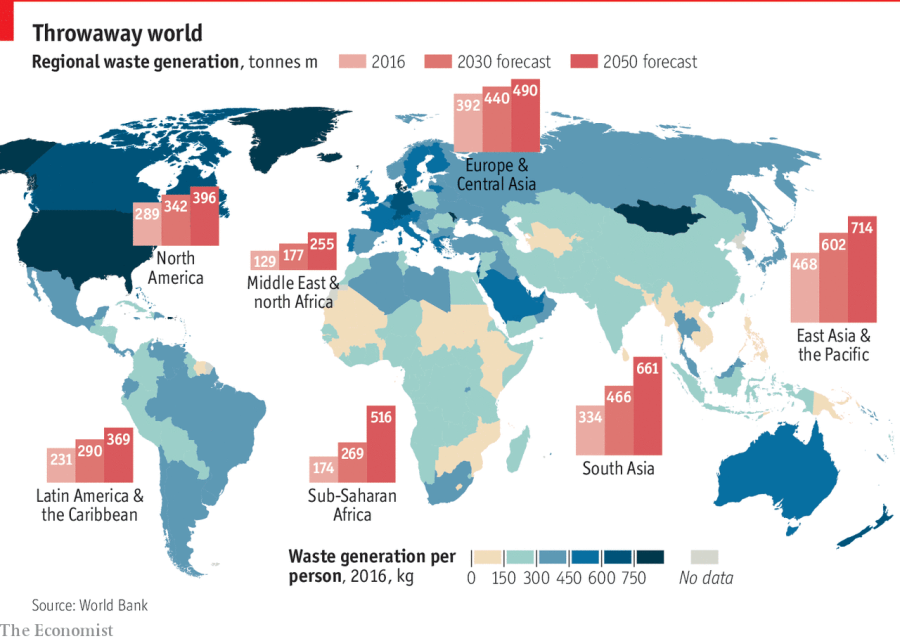
Global waste production represents 2.01 billion tonnes per year according to World Bank estimates in 2018 (this figure relates to municipal waste). The latest World Bank report, “What a Waste 2.0”, published in 2018, warns of the situation which is becoming catastrophic, due to the rapid urbanization of developing countries.
High-income countries account for only 16% of the world’s population, but produce a third (34%) of the planet’s waste. 23% of the global production of this waste is produced by South and East Asia.
The situation is especially critical with regard to plastic waste, which represented 242 million tonnes in 2016, and contaminates seas and soils.
Waste treatment
The What a Waste 2.0 report highlights the fundamental importance of good household waste management, which is often overlooked in developing countries. They recycle an average of 4% of their waste, compared to more than a third in high-income countries.
The report also estimates that the treatment and disposal of waste emitted 1.6 billion tonnes of CO2 equivalent in 2016, i.e. 5% of greenhouse gas emissions. According to the waste management specialists at Irving dumpsters, better recycling and waste reduction could cut that number in half.
The Cyclops annual report underlines the importance of “balancing” waste treatment methods in France: storage, incineration and recycling (the most ecological of the three treatments). A point of view contested by certain defenders of the environment, who would like to limit storage and incineration, the “worst” solutions to overcome waste. In Germany, storage without prior treatment has been prohibited since 2005.
The 34 member countries of the OECD (including the European Union) generated 572 million tonnes of urban waste in the year, or 44% of urban waste in the world, including food waste.
According to Eurostat figures published in March 2012, landfill is the most widely used solution to get rid of 38% of municipal waste in the EU-27. The countries that use landfills the most are the last. entry into the Union of 27: Bulgaria (100%), Romania (99%), Lithuania (94%) and Latvia (91%).
The production of waste in rich countries tends to slow down under the effect of the economic crisis but also by the increased efficiency of the economy which increasingly uses recycling channels.
Efforts are focused on treating waste all over the world and particularly in Great Britain. Until a few years ago, it dumped its hazardous liquid waste directly into the North Sea. Long a follower of landfill (a not very “ecological” solution), Great Britain is gradually converting to recycling.
Global waste production
Global waste generation in 2006 was 3.4 to 4 billion tonnes of waste, including 1.7 to 1.9 billion tonnes of municipal waste, 1.2 to 1.67 billion tonnes of non-hazardous industrial waste and 490 million tonnes of hazardous industrial waste: out of this total 2.74 billion tonnes of waste were collected and collected, including 1.24 billion municipal waste.
In total volume, China has become the leading producer of municipal waste with 400 million tonnes in 2015.
In the following countries, 500 kilos and more of municipal waste are produced per person per year: Hong Kong, Turkey, the EU-15, Australia and the USA.